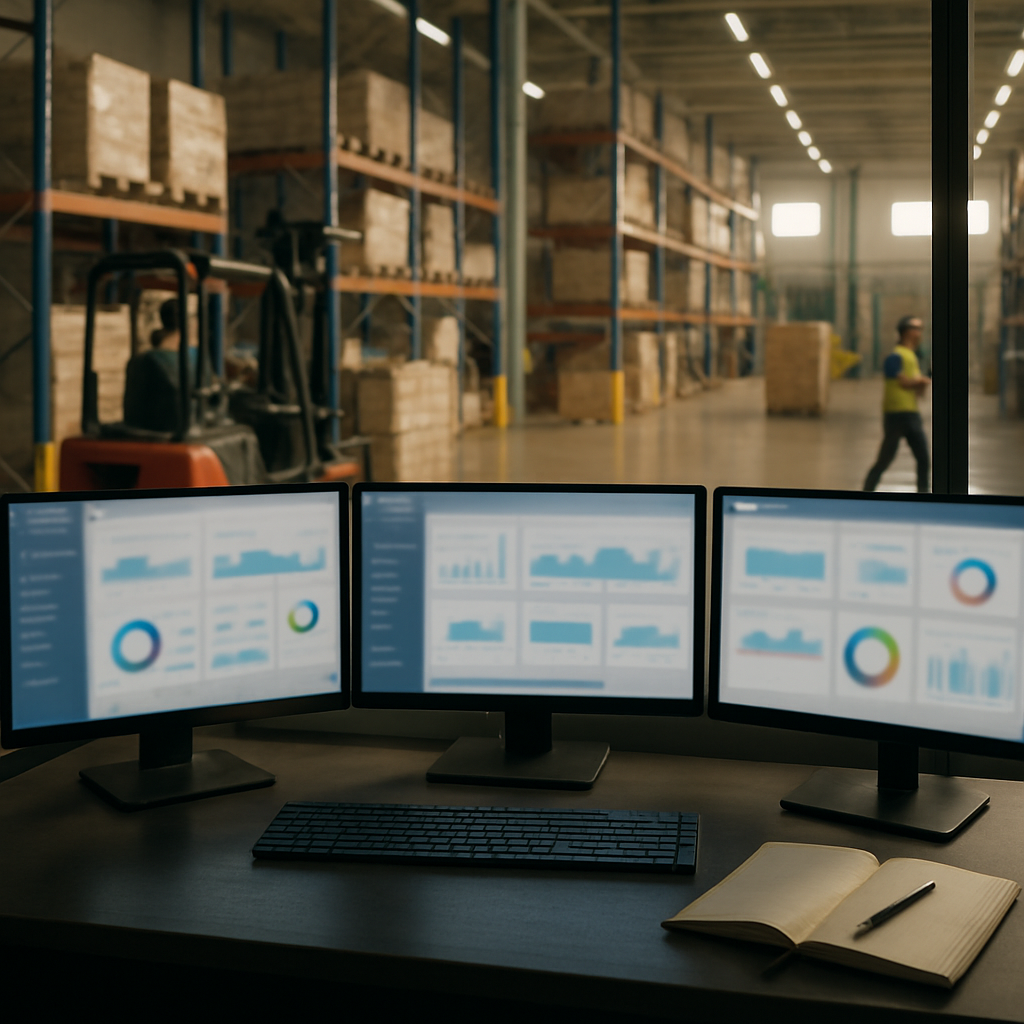Reducing Operational Costs with a Scalable ERP System
Operational leaders and CFOs are under pressure from every direction. Costs are rising. Margins are tightening. Complexity keeps increasing.
11 min read
Admin : Updated on May 14, 2025
Retailers face constant pressure to meet customer expectations while juggling complex operations across stores, websites, and third-party marketplaces. Shoppers expect a smooth experience no matter where they browse or buy, and any disconnect can quickly lead to missed sales or customer churn. To keep up, retail businesses need systems that do more than just manage data—they need tools that bring everything together.
That’s where a well-implemented ERP system comes in. A custom ERP solution like NetSuite not only tracks sales and inventory, but it also helps streamline the entire retail operation. From financials and fulfillment to customer engagement and analytics, ERP customization gives retailers the flexibility to tailor workflows to their specific needs. When done right, it helps businesses optimize business processes, reduce errors, and stay competitive in an industry where speed, consistency, and adaptability are everything.
NetSuite offers foundational elements that cater to a wide range of retail operations. Its core features revolve around financial management, inventory tracking, and sales order processing, ensuring each component of a retailer’s workflow is captured within a single ERP system. This includes real-time visibility into stock levels, point-of-sale transactions, and accounting data—all harmonized under one solution.
The advantage is that retailers can operate more smoothly and avoid the pitfalls of siloed software solutions, where separate systems might not always synchronize properly. NetSuite’s comprehensive approach fosters collaboration between departments, supports rapid decision-making, and reduces the risk of miscommunication that can stem from outdated or incomplete data.
The platform’s cloud-based architecture offers an additional layer of scalability and accessibility that traditional on-premises solutions struggle to match. Many retail businesses look for ERP solutions that can adapt quickly as they grow or shift their product lines, and NetSuite’s native cloud design meets that requirement. Users can access key data from anywhere, enabling cross-functional teams to collaborate seamlessly and management to monitor developments in real time.
Aside from this, NetSuite integrates with a variety of e-commerce and third-party applications, making it a hub for the different technological tools retailers rely on. This connectivity underlines the importance of ERP customization because every retailer’s ecosystem of sales channels, apps, and specialized needs can be woven into a single coherent platform.
The retail industry is dynamic, so a solution that remains rigid will eventually hinder growth and innovation. NetSuite’s flexibility enables retailers to tailor workflows, dashboards, and reporting structures to their specific needs. Whether it involves automating a new order workflow for a pop-up store, creating distinct fulfillment processes for online versus in-store purchases, or adding specialized marketing capabilities, NetSuite’s customizable options make it possible to adapt to evolving business goals.
The result is an ERP solution that does not only handle back-end processes but actively supports every strategic move a retailer makes. This comprehensive adaptability paves the way for a truly custom ERP system environment that boosts efficiency, enhances customer experiences, and positions organizations for consistent growth.
Omnichannel operations encompass brick-and-mortar locations, e-commerce websites, marketplace listings, and even call centers. NetSuite’s robust integration capabilities allow retailers to merge data from every touchpoint into one ERP system, ensuring accurate and real-time visibility over orders, inventory, and customer profiles. Instead of juggling disjointed channels with separate data sets, retailers gain a single source of truth that streamlines operations.
This approach removes the complexity inherent in trying to manually consolidate transactions or product availability across different platforms. As a result, retail business teams can spend less time reconciling numbers and more time focusing on strategic activities that drive business success.
When an ERP solution is customized to handle omnichannel orders, fulfillment workflows can become remarkably efficient. NetSuite supports the creation of unique routing rules to ensure orders from an online store are shipped from the closest retail location, reducing shipping times and improving customer satisfaction. These automations can also handle returns processing across multiple channels so that in-store returns for online purchases become a seamless experience.
Tailoring these workflows to unique business requirements within NetSuite results in fewer errors, quicker turnaround times, and a transparent record of every transaction and shipment. This high level of coordination helps maintain strong customer loyalty in a competitive retail landscape.
An effective omnichannel strategy is not limited to delivering products. It also encompasses how retailers engage with their audience, both in-store and online. NetSuite’s unified data repository makes it possible to track customer preferences, purchase histories, and support inquiries across all channels. Marketers can then customize campaigns and offers that speak directly to each segment of the customer base, while customer support teams can instantly access account details for personalized service.
When these interactions are handled by a customized ERP system that unifies back-end processes with frontline engagement, customers see consistent messaging and experience a smoother journey, regardless of whether they shop in person or through digital platforms.
Inventory imbalances—such as overstocking or stockouts—can cause major headaches in a retail business. NetSuite’s standard modules deliver inventory monitoring across different locations, but a thorough ERP customization process refines the data you see, when you see it, and how it informs decisions.
Real-time dashboards customized to the retailer’s specific needs can highlight current levels of key items in each warehouse, identify potential shortfalls, and prompt proactive measures. This immediate visibility prevents guesswork and makes replenishment decisions far more accurate, thereby protecting margins and keeping customers happy when items remain consistently in stock.
Customizing NetSuite’s analytics and reporting capabilities for retail operations is vital for predicting consumer demand. Historical data, seasonal trends, and geographic variations are all variables that can be configured to produce actionable insights.
For instance, if certain regions show spikes in demand for a specific product category, NetSuite’s forecasting tools can factor that in when creating purchase orders or allocating inventory.
Because these insights are integrated with the rest of the ERP system, retailers can react swiftly and optimize reorder points to match real-world demand. The result is a data-driven environment that aligns business operations with actual market dynamics.
One of the biggest breakthroughs that a custom ERP brings to inventory management is automated restocking. Retailers often set threshold levels for key products, and NetSuite can send out purchase orders the moment stock levels dip below those parameters. This ensures that popular products are replenished promptly and that less-popular items do not eat up valuable warehouse space unnecessarily.
Retailers can also configure the system to factor in supplier lead times, seasonal surges, or bundling promotions. The more these parameters reflect the retailer’s unique business rules, the more efficient the entire supply chain becomes. It saves time, eliminates many manual tasks, and fosters better relationships with suppliers who appreciate predictable and well-managed ordering schedules.
Point-of-sale systems generate some of the most critical retail data, capturing every transaction and customer interaction. Integrating these POS touchpoints with NetSuite in a cohesive ERP system can unify sales, inventory, and financial data without manual re-entry. Whenever an item is sold at a physical store, stock levels update instantly across the entire platform, ensuring that other channels have the most recent information.
This synchronization can also reduce discrepancies in financial reporting, as sales data flows into NetSuite’s accounting module. A truly customized ERP solution ensures that relevant data is mapped to the right fields, so the retailer never has to worry about missing or inaccurate transaction information.
Every retail business has its own set of rules, promotional strategies, and customer engagement tactics. Some may offer loyalty programs, while others focus on limited-time pop-up locations. A standard POS might not accommodate every scenario. That is where customization comes in.
Retailers might need the POS interface to display tailored pricing for special membership levels or to handle location-specific promotions. They might also require specialized workflows for handling gift cards or custom bundles. Configuring NetSuite’s POS solution means these adjustments become a natural part of the sales process, rather than forcing staff to develop workarounds or maintain clunky side systems.
Retail staff members are often on the front lines, assisting customers and finalizing sales in real time. If they spend too much time keying in product codes or toggling through multiple interfaces, the risk of data entry errors rises, and the customer experience may suffer.
A custom ERP solution tightly integrated with the POS helps retailers eliminate friction points during checkout. Tasks like applying discounts, validating stock, or processing returns can be automated, allowing staff to focus on the customer rather than the screen. This reduces the chance of data entry errors and speeds up transactions across retail locations. Accurate data flow from the POS to the ERP system also ensures financial reports stay reliable and consistent.
Retailers thrive when they align messaging with customer interests. Segmenting customers based on data captured in NetSuite creates the perfect environment for specialized marketing campaigns. Customized ERP implementations can track variables like purchase frequency, average spend, and product preferences.
Marketers can then develop promotions or special events that resonate with a particular group, rather than blasting one-size-fits-all messaging across the entire customer base. In a competitive retail industry, the ability to tailor offers to different segments can substantially boost conversion rates and customer loyalty.
Customer data in NetSuite provides a 360-degree view that includes order histories, returns, support tickets, and even website interactions if integrated with e-commerce. Customization further refines these profiles by adding fields that align with a retailer’s unique business needs. This allows sales teams and support agents to see a customer’s full relationship with the brand at a glance, making interactions more meaningful.
When the system shows that a particular customer frequently purchases a certain product category, employees can suggest complementary items or inform them of upcoming sales. This creates a more personalized shopping experience and fosters long-term loyalty.
A customized ERP system can automatically trigger actions based on what that data shows. Retailers can set up NetSuite to send personalized emails or text messages when a customer hits a certain spend threshold, celebrates a birthday, or engages with a promotion. Follow-ups for things like abandoned carts, overdue invoices, or service requests can also be automated. These real-time, tailored interactions make campaigns more effective, helping build stronger customer relationships and encouraging repeat business.
Data matters only if it can be quickly accessed and understood. Customized dashboards in NetSuite highlight the KPIs that matter most to each department, whether that is sales revenue, inventory turnover, or customer acquisition costs. A retail business might opt to track category-specific metrics for apparel versus electronics, or examine geographic trends to see where their products sell best. Since NetSuite updates these metrics in real time, managers no longer wait for monthly reconciliations or external reports. This speed allows them to respond swiftly to emerging opportunities or potential issues.
Retailers often rely on a handful of top-selling products to sustain revenue, and it’s just as important to identify which items are underperforming. Customizing NetSuite’s reporting to highlight product-level performance gives managers a clear view of what’s working and what’s not. With that insight, they can adjust pricing, shift marketing focus, or plan promotions to move slower inventory. This kind of responsive, data-backed approach helps improve profitability and keeps product strategies aligned with what customers actually want.
The retail landscape can shift abruptly, and delayed decisions may lead to missed opportunities. Real-time analytics within NetSuite enable quick responses, such as immediate price adjustments, ordering shifts, or the launch of flash promotions. Since data from sales, inventory, and marketing channels aggregates in a single ERP system, managers do not have to scramble to compile reports from multiple sources. The ability to pivot quickly, guided by accurate and current metrics, can be the difference between a retailer that thrives in competitive conditions and one that struggles to keep pace.
Business growth can be exhilarating, especially in retail, where expansion might take the form of new product lines, additional store locations, or extended e-commerce platforms. NetSuite’s native cloud-based ERP environment eases the challenges that come with scaling. Rather than installing new servers or migrating critical data to another system, retailers simply adjust their usage within the platform.
A well-structured custom ERP design means each expansion builds on existing systems or frameworks, instead of requiring a complete overhaul. This approach accelerates new store rollouts or product launches, letting the business keep pace with market demands without sacrificing operational stability.
While standard ERP solutions streamline basic operations, retailers frequently have processes that do not fit neatly into a generic template. Some might offer customized products that require more complex order workflows or specialized vendor relationships. Others might operate pop-up locations with unique challenges in inventory tracking and staff scheduling. NetSuite’s flexible structure supports custom fields, triggers, and business logic, so retailers can shape every workflow around their specific needs. This approach ensures that critical tasks flow smoothly, from receiving inventory to finalizing sales, and that the ERP system enhances productivity rather than constraining it.
In an environment where consumer preferences evolve and new sales channels emerge, an ERP customization strategy needs to be a continuous journey rather than a one-time project. Setting up NetSuite with modular, easily adjustable components lays the groundwork for ongoing updates.
When a retailer decides to launch a subscription service, add a warehouse for faster shipping, or integrate a new e-commerce partner, the ERP system can adapt with minimal disruptions. This iterative mindset ensures that each innovation or improvement is grounded in reliable data, proven workflows, and a clear focus on driving business growth.
Successful ERP implementations hinge on a detailed evaluation of what the retail business requires. Customization should always align with clearly defined goals, whether those involve cutting shipping times, improving marketing campaigns, or managing finances more accurately.
A needs analysis sheds light on existing inefficiencies, bottlenecks, and redundancies. Armed with this knowledge, retailers can create a blueprint for NetSuite configurations that address real-world challenges instead of implementing changes based on assumptions. This planning phase prevents wasted resources and helps ensure that every modification contributes to tangible business benefits.
ERP customization is not the responsibility of just one department. It affects everyone who relies on the platform, from frontline store associates to executives in corporate offices. Involving representatives from different areas of the retail business opens the door to feedback and insights that might otherwise go unnoticed.
Employees who regularly handle returns, for instance, can explain what a custom workflow might need to include to make the process seamless. External consultants with experience in ERP development and retail implementations can also offer invaluable expertise, anticipating challenges and recommending industry-specific optimizations.
Even the most well-conceived customizations will falter if not tested rigorously. Before deploying new features into a live retail environment, it is vital to conduct real-world testing scenarios. This might involve processing orders in a sandbox environment, integrating a new point-of-sale setup, or verifying that analytics reports display accurate data. Equally important is documentation. Each customized workflow, script, or integration should be recorded in detail, making it easier to troubleshoot issues when they arise. Proper documentation helps maintain continuity as the business grows and new team members or consulting partners come on board.
One of the most immediate benefits retailers notice after strong ERP implementations is a boost in operational efficiency. Manual tasks shrink because automated workflows handle repetitive processes, reducing the potential for human error.
Customer satisfaction also tends to soar because data is unified and consistent across the organization, making it simpler to manage inquiries or handle special requests. These enhancements combine to form a competitive edge in a retail marketplace where responsiveness and convenience can shape long-term loyalty.
Customization can become complicated if it is not approached with clear objectives. Retailers that over-customize their ERP solution risk building convoluted workflows that slow adoption and create confusion among staff. Excessive customization can also raise maintenance costs, as specialized scripts and integrations may need more frequent updates.
Careful planning, prioritization of essential features, and modular ERP customization help mitigate these risks. Focusing on the changes that promise the greatest return on investment ensures resources are used wisely and complexity is kept under control.
As NetSuite evolves with new releases, heavily customized functionalities may require extra attention to remain compatible. Maintaining detailed documentation and following recommended best practices simplifies the upgrade process. User adoption also plays a pivotal role in whether customizations deliver on their promise.
Even the best features fall short if staff members lack sufficient training or resist new processes. Clear communication, hands-on demos, and follow-up support help employees understand how the ERP system’s customizations make their jobs easier, encouraging them to embrace the changes and contribute to a thriving retail environment.
Retail success depends on having systems that do more than manage operations. They need to connect the dots across your entire business. A tailored ERP solution like NetSuite brings everything together in one place, from inventory and fulfillment to sales, marketing, and customer data. With the right ERP customization, retailers can streamline operations, improve day-to-day efficiency, and build a foundation for growth that adapts as the business evolves.
Centium works closely with retail teams to design ERP solutions that align with their specific goals, challenges, and workflows. Whether you're optimizing what already works or expanding into new channels, we’ll help you personalize NetSuite to fit your business needs.
Want to simplify processes, improve visibility, and support long-term success? Book a consultation with Centium and start building a custom ERP solution that moves your retail business forward.

Operational leaders and CFOs are under pressure from every direction. Costs are rising. Margins are tightening. Complexity keeps increasing.

How well you manage your supply chain directly affects your company's financial health and keeps your customers happy. Running a supply chain today...

Inventory managers and COOs face relentless pressure to reduce costs while improving customer satisfaction. The core of this challenge lies in...